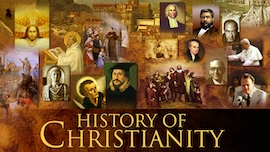Ludmila Died a Martyr for Having Too Much Christian Influence
IT WAS through the concern of the great missionary Methodius that Ludmila, now venerated as a saint in Bohemia (modern-day Czech Republic), became a Christian. While away on business, Duke Boriwoy, Ludmila’s husband, met Methodius. Observing that the Duke refused to eat at table with Christians, Methodius spoke to Boriwoy of the benefits of conversion and baptism. The Duke and his associates took this counsel to heart, and after receiving instruction in the faith, were baptized.
Boriwoy returned home accompanied by a priest, where Ludmila also abandoned her idols to follow the faith. The pair built a church in their castle and endeavored to convert Bohemia to Christianity.
The Bohemians, however, were not buying it. They drove out Boriwoy and Ludmila and placed Prince Strogmin on the throne. But they soon tired of Strogmin’s rule and forced him into exile. Boriwoy returned to the throne for seven more years. During these years, he and Ludmila built the first church in Prague.
Following Boriwoy’s death, his two Christian sons Spitignev and Wratislaw each ruled briefly, but both died young. Ludmila continued to mourn her former sins and to promote Christianity while practicing charity and hospitality.
Wratislaw left twin sons at his death: Wenceslaus (Václav) and Boleslaus. Wenceslaus lived with Ludmila and became a Christian (the “Good King Wenceslaus” of the Christmas carol). Boleslaus remained with his ambitious mother, Drahomíra, who ruled as regent. Although she claimed to be a Christian, it was soon apparent she despised the faith.
Resentful of Ludmila’s Christian influence over Wenceslaus, Drahomíra ordered her killed. Tradition has it that two unscrupulous knights strangled Ludmila with her own veil on this day, 15 September 921. Drahomíra then attempted to remove Christian influence from around Wenceslas. Her policy failed.
Outraged by his grandmother’s murder, the teenage Wenceslaus seized the throne, deposed Drahomíra (although he did not kill her), and reigned in her stead. However, his willingness to accept counsel from clergymen, his suppression of his nobles, who jealously guarded their power, and his acceptance of the German king, Henry I, as overlord produced widespread disaffection among the Bohemians. His brother Boleslaus invited him to a religious feast and entertained him royally. On the way to mass the next morning, Boleslaus attacked and killed Wenceslaus and mounted the throne himself.
—Dan Graves
----- ----- -----
Learn more about the History of Christianity at RedeemTV

History of Christianity can be purchased at Vision Video.






